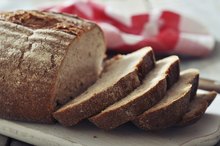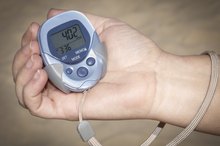How Much Weight Can a Person Lose by Running Half a Mile Each Day?
Adding physical activity to your daily routine can help you shed unwanted pounds 2. Exactly how much weight you lose will depend on just how much activity you add. While a half mile of running won't yield quick weight loss, it will have an effect in the long term. For more significant results add more physical activity and limit your calorie intake 2.
Calories Burned
A half mile is a relatively short distance to run, so you shouldn't expect a big calorie burn. According to the website Cool Running, a 200-pound person will burn 79 calories running half a mile. A 175-pound person will use less energy, burning just 69 calories per half mile. For a 150-pound person the calorie burn will be about 59 calories.
- A half mile is a relatively short distance to run, so you shouldn't expect a big calorie burn.
- According to the website Cool Running, a 200-pound person will burn 79 calories running half a mile.
Weight Loss
Calories in a Slice of Whole-Grain Bread
Learn More
A single pound of fat is equal to 3,500 calories. Running for half a mile per day will put a dent in this goal, but the results won't be quick. At this rate a 200-pound person would need to run half a mile each day for 44 days to lose just one pound. For a 175-pound person it would take 51 days and a 150-pound person will need 59 days -- nearly two months -- to shed one pound.
- A single pound of fat is equal to 3,500 calories.
- For a 175-pound person it would take 51 days and a 150-pound person will need 59 days -- nearly two months -- to shed one pound.
Increasing Activity
If you're looking for a way to burn fat more quickly, you can simply add more exercise to your routine. For instance, if you gradually increase your runs to one mile you can double your calorie burn. Even simple activities like brisk walking, or mowing the lawn with a push mower will increase your calorie burn. According to the Centers for Disease Control and Prevention, you should get at least 150 minutes of moderate-intensity aerobic exercise per week or 75 minutes of vigorous-intensity aerobic exercise.
- If you're looking for a way to burn fat more quickly, you can simply add more exercise to your routine.
- For instance, if you gradually increase your runs to one mile you can double your calorie burn.
Diet
How Many Calories Should Be Burned to Lose 2.2 Pounds?
Learn More
Exercise alone won't necessarily result in any weight loss. If you burn 79 calories running and then celebrate your achievement with a 300-calorie piece of cake or refuel with a 200-calorie sports drink, you'll actually gain weight over time 1. To lose weight the total number of calories you burn from exercise combined with the total calories cut from your diet should create a deficit of 500 to 1,000 calories a day. This will result in weight loss of one to two pounds per week.
- Exercise alone won't necessarily result in any weight loss.
- To lose weight the total number of calories you burn from exercise combined with the total calories cut from your diet should create a deficit of 500 to 1,000 calories a day.
Related Articles
References
- CDC: Physical Activity
- Hall KD, Sacks G, Chandramohan D, et al. Quantification of the effect of energy imbalance on bodyweight. Lancet. 2011;378(9793):826-37. doi:10.1016/S0140-6736(11)60812-X
- Centers for Disease Control and Prevention. Physical activity for a healthy weight. Updated May 15, 2015.
- Viana RB, Naves JPA, Coswig VS, et al. Is interval training the magic bullet for fat loss? A systematic review and meta-analysis comparing moderate-intensity continuous training with high-intensity interval training (HIIT). Br J Sports Med. 2019;53(10):655-664. doi:10.1136/bjsports-2018-099928
- Ainsworth BE, Haskell WL, Herrmann SD, et al. 2011 Compendium of Physical Activities: A second update of codes and MET values. Med Science Sports Exerc. 2011;43(8):1575-1581. doi:10.1249/mss.0b013e31821ece12
- Donnelly JE, Blair SN, Jakicic JM, Manore MM, Rankin JW, Smith BK. Appropriate physical activity intervention strategies for weight loss and prevention of weight regain for adults. Med Science Sports Exerc. 2009;41(2):459-471. doi:10.1249/mss.0b013e3181949333
- Sanghvi A, Redman LM, Martin CK, Ravussin E, Hall KD. Validation of an inexpensive and accurate mathematical method to measure long-term changes in free-living energy intake. Am J Clin Nutr. 2015;102(2):353-358. doi:10.3945/ajcn.115.111070









